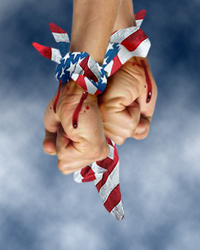In the wake of the ICRC report one can make several definitive statements:
1. Beginning in the spring of 2002 the United States government began to torture prisoners. This torture, approved by the President of the United States and monitored in its daily unfolding by senior officials, including the nation's highest law enforcement officer, clearly violated major treaty obligations of the United States, including the Geneva Conventions and the Convention Against Torture, as well as US law.
2. The most senior officers of the US government, President George W. Bush first among them, repeatedly and explicitly lied about this, both in reports to international institutions and directly to the public. The President lied about it in news conferences, interviews, and, most explicitly, in speeches expressly intended to set out the administration's policy on interrogation before the people who had elected him.
3. The US Congress, already in possession of a great deal of information about the torture conducted by the administration—which had been covered widely in the press, and had been briefed, at least in part, from the outset to a select few of its members—passed the Military Commissions Act of 2006 and in so doing attempted to protect those responsible from criminal penalty under the War Crimes Act.
4. Democrats, who could have filibustered the bill, declined to do so—a decision that had much to do with the proximity of the midterm elections, in the run-up to which, they feared, the President and his Republican allies might gain advantage by accusing them of "coddling terrorists."
5. The political damage to the United States' reputation, and to the "soft power" of its constitutional and democratic ideals, has been, though difficult to quantify, vast and enduring.





